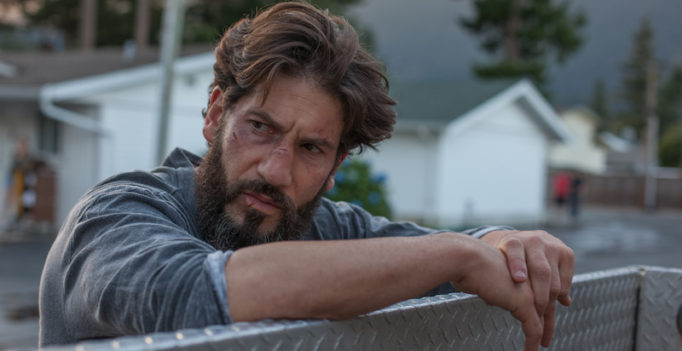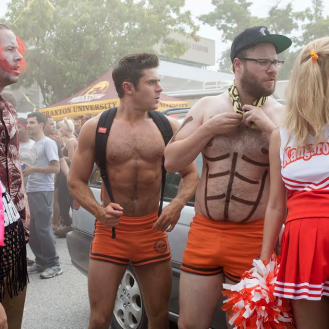Sweet Virginia is an ant hill of a movie – if you look underneath its still surface, you’ll find many working parts. There are many strengths, but director Jamie Dagg, screenwriters Benjamin and Paul China, and the phenomenal cast do a very good job at subtlety concealing them; allowing the film to wash over the audience from start to finish.
Th film is abrasive at first; it acts on the audience with violence and surprises, and sets a bar for its inevitable intensity. Sweet Virginia is bound to get physical again, but movie goes can’t predict when. Jamie Dagg, an intelligent filmmaker, is aware of the power the film holds, and he understands that the best option for this secret weapon is maintaining a straight face while the audience wraps themselves into knots. Dagg has also been blessed by two exceptional lead performances by Jon Bernthal (Baby Driver, Netflix’s The Punisher) and Christopher Abbott (James White, HBO’s Girls).
Motel manager Sam (Bernthal) lives a quiet life as he heals from a rodeo injury, but he becomes on edge around Elwood (Abbott). Elwood is a drifter with a menacing blank slate; he’s unusually hard to read. The audience would like to keep their distance as well because, unlike Sam, we know about Elwood’s temper and occupation. However, Sweet Virginia consistently sinks the audience further in the film’s foreboding dread as other characters are linked to Elwood’s misbehaviour.
Building tension is a special skill that takes some filmmakers years to develop, yet newcomer Jamie Dagg has perfected it; making Sweet Virginia an unsettling puzzle for viewers piecing together the history of various characters as they anticipate their next jolt.
I received an opportunity to pick Dagg’s brain. I wanted to know the key to building tension, and if audiences should be expecting more intricate films like Sweet Virginia from him in the future. But first, what was it like working with two powerhouse actors?
Addison Wylie: Jon Bernthal and Christopher Abbott are exceptional in this movie. Their earlier scenes strike this special awkward chemistry where Bernthal is trying to read a very troubled Abbott, which turns into a hostile energy between the characters. How excited were you to get these two actors interacting with each other in Sweet Virginia?
Jamie Dagg: I was very excited, but also very nervous because their first big scene together – the scene in the diner – is originally six pages of dialogue and we only had about four hours to shoot it, which isn’t exactly a lot of time. Jon had done some scenes already, but Chris hadn’t. And, despite discussing the role for a number of months – on and off – and creatively being on the same page, I was nervous that I didn’t have the time to massage a performance in a key scene, and that would set the standard for the rest of the 21-day shoot.
After doing the first take, Jon and Chris had such a chemistry between them. I remember running over to my producer and both of us were like giddy kids, and giving each other the “thumbs up”. At that point, we knew we were going to be good. Despite the fact that we’d have to plow through certain scenes, we’d end up managing and every take would be fantastic. Our problem in the edit was not trying to cobble together a performance, it was determining which great take to use.
AW: Christopher Abbott becomes so menacing and unpredictable in his role, that the audience is almost prompted to laugh out of nervousness. Is it tough trying to find that reaction from movie goers? I imagine it takes a lot of control to make sure those moments don’t become too eccentric.
JD: It’s a fine line. I think the way people deal with feeling uncomfortable varies – some people laugh, some people freeze up and become almost mute. I’m really proud with what Chris did and I think despite the fact that there are really intense moments with paroxysms of anger, it’s restrained enough to be believable. He really did create an interesting, dynamic character; he brought a lot of life.
AW: What’s the key to building tension? Sweet Virginia absolutely succeeds at keeping movie goers on the edge of their seats, but is that suffocating atmosphere established more on-set with actors utilizing silences or with a good editor?
JD: A lot of the film’s most tense scenes are just really simple. Obviously, an editor has a lot to do with it, but it’s the silence – it’s the expectation that something is going to happen. Allowing those scenes to breathe, building in the silence, eventually fading out the music, and not resorting to gimmicks (like an explosive “BANG”). There’s a stillness to the process that helps build tension. You have an idea that a scene will be tense, but if you actively set out to make “the most intense scene possible”, you’re gonna fail. It happens organically.
AW: I admired your use of space in Sweet Virginia. By that, I mean you certainly have the audience search the entire frame for detail pertaining to the scene. It’s akin to spinning plates or sleight of hand – the audience is forced to spread their focus and make mental notes along the way.
JD: I think a lot of that has to do with, again, allowing scenes to breathe. Also, giving the audience some credit – we don’t do that enough. Audiences don’t need to be spoon fed, and we don’t have to hold their hands.
AW: Is this a type of visual storytelling you hope to carry through your filmmaking career?
JD: Visually, I’ll approach every film differently. My first film River has a different feel and pacing to it, Sweet Virginia is more of a slow burn. But generally, yes, that’s the direction I want to keep moving in.
*********
Do You Tweet? Follow These Tweeple:
Addison Wylie: @AddisonWylie







Leave a comment